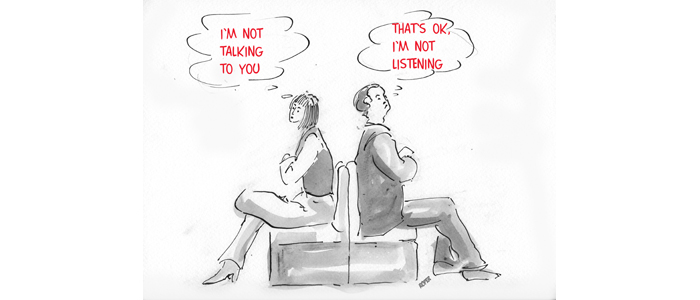How empathetic are you? Are you a softie as a leader? Read this article and find out about the simple E test you can try out at work.
American social scientists invented the E test to investigate the connection between power and empathy. This seemingly innocent party trick is something they used to measure someone’s ability to see the world from another’s viewpoint. In other words, to work out how empathetic people are – particularly people in a position of power.
This is a simple test you can try out on your boss or your colleagues:
- Ask your colleague to use his/her right index finger to draw a capital E on his/her forehead.
- People who draw the E so that it’s backward to themselves but legible to others, take the other person’s perspective.
- People who draw the E so that they could read it themselves but backward to others, do not consider the other person’s point of view.
The scientists found that most people seemed naturally inclined to take the other’s perspective. However, those people who were in a position of power were less likely to draw the E so that it was legible to others. Their findings suggested that power was connected to a lack of empathy.
Of course, empathy isn’t the only quality you look for in great leaders. Thinking strategically and acting vigorously are essential. But if you tend to ride roughshod over people and your leadership style is mostly command and control, ultimately people will resist you. They will comply rather than engage. In the end people mostly leave bosses, not companies.
There is increasingly an awareness and focus on EQ rather than IQ. Medical schools, especially in the US, are using questionnaires to measure empathy levels of young doctors. This is because scores on the empathy index correlate with better outcomes for patients, in ways that traditional metrics do not.
And in business, although your technical skills are very important, it’s empathy that will build lasting client relationships and loyalty in your team.
Until recently, there’s been a tendency to write off qualities such as empathy as a ‘soft skill’. If you’re the boss, you might be horrified to be described as a ‘softie’. But don’t think this means you’re weak. It means you have a high EQ; you listen more and talk less and you show people respect.
And if one of your employees asks you to draw a vowel on your forehead, you know what to do.
Thanks to Daniel H. Pink.
If you’d like to find out more about how to develop your empathy by improving your active listening skills, click on the image below to receive a free chapter from Kate Mercer’s book ‘A Buzz in the Building‘:

